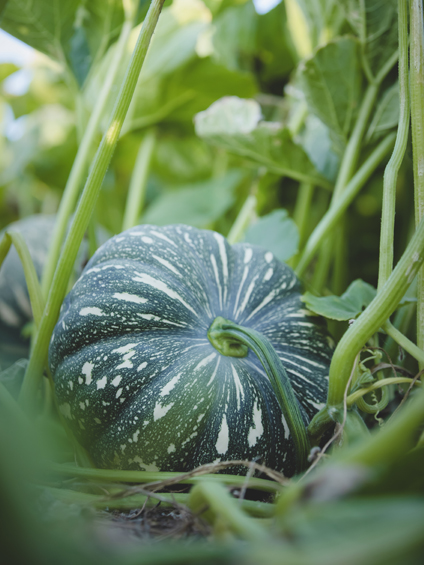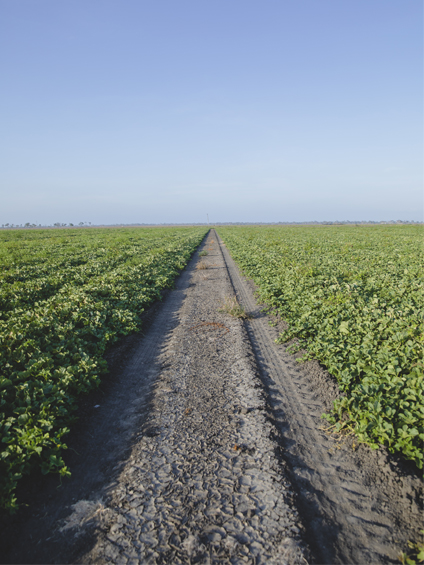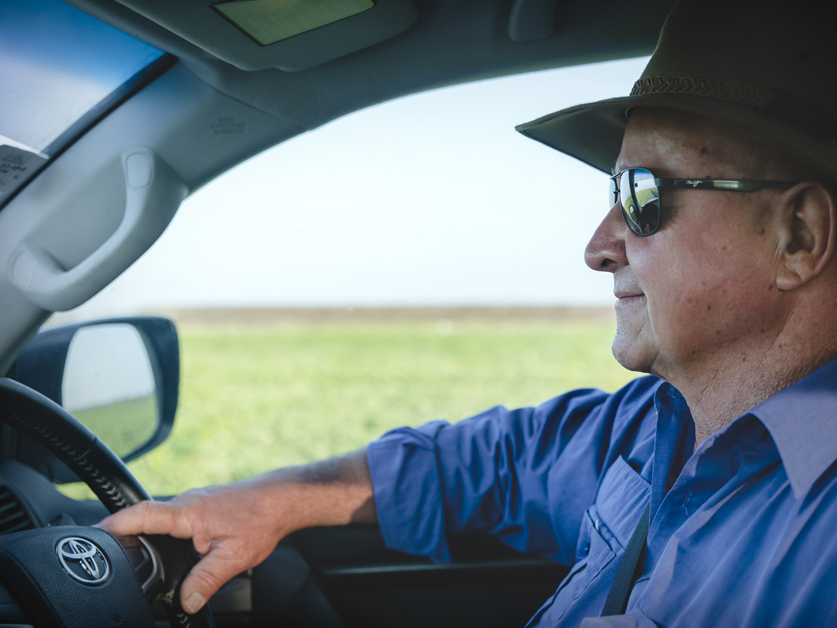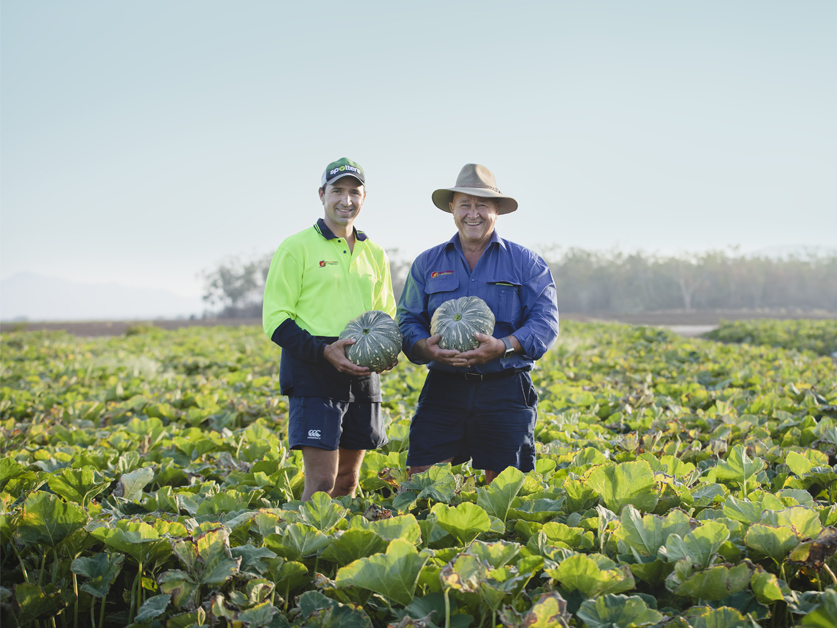Building a growing enterprise in far-north Queensland
In a career spanning four decades, fruit and vegetable growers Des and Paula Chapman have endured three cyclones and drought on their Gumlu property in far-north Queensland. However, the couple has bounced back each time and today, Rocky Ponds Produce is thriving. Michelle De’Lisle speaks to Des about the business’ latest innovation, its export activities and what lies ahead.
Forty years ago, Des and Paula Chapman purchased a small parcel of undeveloped land in far-north Queensland to create a horticulture enterprise. The husband-and-wife began their fruit and vegetable growing journey with one tractor and one truck for transportation, and no buildings at the Gumlu site.
“Everything had to be developed from scratch,” Des says.
It came down to trial and error when choosing which crops to grow before Des and Paula eventually settled on three major commodities: melons, capsicum and pumpkin, which they – along with their son Evan – still grow today as Rocky Ponds Produce.
Des is Managing Director of the business, which involves overseeing the entire growing process. Off-farm duties include keeping up with all the relevant laws and legislation; keeping abreast of changes and developments in the industry; being aware of and adopting new trends; ensuring that Rocky Ponds has a competent workforce; being responsible for on-farm capital investment, and maintaining relationships with suppliers and customers.
Today, Rocky Ponds’ produce lines include honeydew, rockmelon and piel de sapo melon; red, green and yellow capsicum; and butternut and Kent pumpkins.


Facing challenges
Like most Australian vegetable growers, water has been an issue for Des and Paula, and the operation’s early years were marred by drought and two cyclones directly hitting the property – there have been three cyclones experienced by the Chapmans across the past four decades.
“Over the years, we have built our own water storage with about 35 hectares being devoted to dams on the property,” Des says.
“The farm has been hit with cyclones, which has created a bit of damage, but you clean up and kick off again. It’s never affected us too much in our start and stop times; it’s created other challenges with diseases and crop losses, but we still manage to start and finish roughly the same time. It does do a lot of damage though.”
Des says that major challenges include maintaining a reliable workforce, along with keeping abreast of the red tape and huge compliance restraints on horticulture.
While these issues can be tricky to navigate, Des thrives working in the fruit and vegetable industry.
“There is always a challenge and a problem to solve. No season is ever the same due to the many variables, particularly weather conditions. I also enjoy marketing and managing our competition, as well as finding new markets and innovation with our own products,” Des says.
Des and Paula extend their enthusiasm for the industry to secondary school students, with Year 8 and Year 12 teachers encouraged to bring their classes out to tour the farm. To date, this has proved successful.
“Since starting this around eight years ago, we’ve already got probably 8-12 people in the district going into horticulture and then other kids looking for farm work so they can work their way up. So, if we’ve created 40 jobs in horticulture, I think we’ve done well,” Des says.
“I think other growers should encourage it, and horticultural groups like Growcom should start saying that these jobs are out there and they’re very much sought-after domestically.”
“These countries may have advantages over us, but I still believe Australian product is superior.”
Innovation focus
At the forefront of Des and Paula’s minds is business sustainability, and they are always on the lookout for the latest technologies that can help to improve growing efficiency, as well adhering to consumer trends.
“I always look to innovations and there are some exciting developments that could make a real difference to farming. Robotics offers possibilities in planting and harvesting, while protected cropping could help fight some of the adverse weather issues that we face. Our temperature-controlled nursery can be further developed for this use.”
The state-of-the-art nursery is the one of the recent investments made by Des and Paula, thanks to a $400,000 grant from the Coles Nurture Fund. Rocky Ponds Produce has been supplying Coles for over 25 years.
Des says that the nursery has produced tremendous results, with a considerable amount of plants grown.
“If it’s too cold outside, the nursery all shuts up and retains the heat; if it gets too hot, everything opens up plus cooling curtains come across the top to get the temperature down. Plants grow at the maximum rate and we get better outputs,” he says.
“We still buy seedlings from outside just in case something ever went wrong but we’re starting to create our own destiny.”
Des says that experience over 40 years has been a great lesson when it comes to maintaining disease resistance and ongoing sustainability of the farm.
“We now employ a full-time agronomist, and we undertake many variety trials to select the most disease-resistant plant varieties,” he says.
“We grow cover crops and engage in crop rotation for soil health. We also operate computerised irrigation and fertigation for reliability of application, and soil monitoring probes to measure water use.”

Export experience
Des and Paula have been exporting their produce for 35 years, entering markets in New Zealand, Singapore, Hong Kong, United Arab Emirates and, more recently, Japan.
Over that time, there have been changes including a steep drop in exports to Hong Kong. Des can see the challenges that lie ahead.
“I think the biggest threat that we’re going to see is that there are a lot of countries in the world now that are exporting. South America is very big – Mexico, Colombia and Brazil are exporting into Europe. I would say they’re probably in front of Australia, so we’ve got a little bit to learn, and we need better shipping. They’ve got better port facilities and their wages are much lower than ours,” he says.
However, Des isn’t overly worried.
“These countries may have advantages over us, but I still believe Australian product is superior.”
Closer to home, Des and Paula make sure that they look after their Australian customers and not focus solely on export activities.
“They helped build us in the beginning and are still supporting us now. We’re extremely happy with the Coles system that we’re under. They have supported us very well and we’ll continue to support them.”
Looking ahead
The future is bright for Rocky Ponds Produce, with Des and Paula’s son, Evan, playing an active role in the business. Evan returned to the farm 10 years ago, and it is likely that a succession plan will go ahead.
Meanwhile, Des is proud of what he and Paula have built over the past four decades, as well as their children’s success.
“Surviving and succeeding in this industry is an achievement. We are among approximately 30 out of 160 growers in the Bowen/Gumlu/Burdekin region who are still operating after 40 years,” he says.
“I am proud of the strong succession that is in place, with Evan taking on a major role in our farm management and exhibiting strong leadership and farming skills, while our three other children have their own businesses – and are doing well.”
This grower profile first appeared in the leading magazine for the Australian vegetable industry, Vegetables Australia. If you’d like to subscribe to receive a new edition of Vegetables Australia in your mailbox every two months, use our online subscription form!
Photography credit: The Third House

